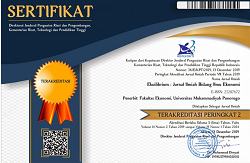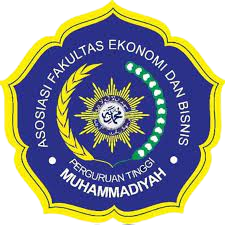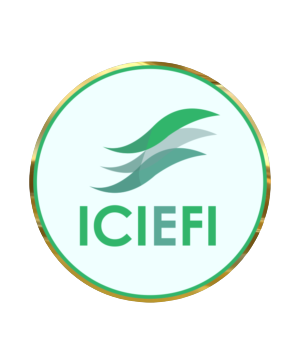Reviewing the Role of Investment in the West Kalimantan Border
DOI: 10.24269/ekuilibrium.v18i1.2023.pp83-93
Abstract
The development of border areas that is rampantly carried out by the government, in addition to reducing regional disparities, also improves regional economic performance as one of the efforts made by the government is through PMA (foreign direct investment) and PMDN (domestic investment). Furthermore, the role of this investment is evaluated to see the extent of its success in the area's economic performance. The study had two objectives; first, to know what variables affect the reduction of the poverty rate and increase in GDP per capita in the border area of West Kalimantan covering five districts, namely Sambas, Bengkayang, Sanggau, Sintang, and Kapuas Hulu. The independent variables used in this study are the realization of PMA and PMDN investment, the number of industries, and the absorption of labor in the industrial sector. Using secondary data for 2019-2021 and Panel Data Regression analysis, it can be seen that only employment in the industrial sector influences increasing GDP per capita and decreasing poverty rates. Meanwhile, the realization of PMA and PMDN investment, as well as the number of industries, did not significantly influence. The second objective of this study is to determine which investment is better based on the Forecasting Method. The Naive Method shows that PMDN investments have a smaller MSE value and a lower MAPE value than PMA investments. It means that PMDN investment is more feasible to be used as an option for future funding development in border areas.
Keywords
References
- Adams, S. (2009). Foreign Direct investment, domestic investment, and economic growth in Sub-Saharan Africa. Journal of Policy Modeling, 31(6), 939–949. https://doi.org/https://doi.org/10.1016/j.jpolmod.2009.03.003
- Afrimadona, A., Darmastuti, S., & Kurniawan, A. (2019). Industrial Park and Welfare Effect: A Preliminary Evidence from Indonesia. Malaysian Journal of Social Sciences and Humanities (MJSSH), 4(7), 77–86. https://doi.org/10.47405/mjssh.v4i7.297
- Agusalim, L., Karim, M., & Yaddarabullah, Y. (2019). Indonesia Cooperative and Members Welfare : a Panel Data Analysis. Economics Development Analysis Journal, 8(1), 9–21. https://doi.org/10.15294/edaj.v8i1.26830
- Anggriawan, R., Maskie, G., & Syafitri, W. (2019). Analysis of the performance of the manufacturing industry sector in east Java Province and implications for strategy preparation. International Journal of Scientific and Technology Research, 8(2), 72–77.
- Arka, S., & Yasa, I. K. O. A. (2015). Pengaruh pertumbuhan ekonomi dan disparitas pendapatan antardaerah terhadap kesejahteraan masyarakat Provinsi Bali. Jurnal Ekonomi Kuantitatif Terapan, 8(1), 44328.
- Arnita, A. (2020). Comparison of Single Exponential Smoothing, Naive Model, and SARIMA Methods for Forecasting Rainfall in Medan. Jurnal Matematika, Statistika Dan Komputasi, 17(1), 117–128. https://doi.org/10.20956/jmsk.v17i1.10236
- Baransano, M. A., Putri, E. I. K., Achsani, N. A., & Kolopaking, L. M. (2016). Analysis of Factors Affecting Regional Development Disparity in the Province of West Papua. Journal of Economics, 4(2), 115–128. https://doi.org/10.15640/jeds.v4n2a10
- Blume, L. E., & Sargent, T. J. (2015). Harrod 1939. The Economic Journal, 125(583), 350–377. https://doi.org/10.1111/ecoj.12224
- Brunet‐Jailly, E. (2012). In the increasingly global economy, are borderland regions public management instruments? International Journal of Public Sector Management, 25(6/7), 483–491. https://doi.org/10.1108/09513551211260685
- Deonandan, R. (2019). Defining Poverty: A Summary of Competing Models. Journal of Social and Political Sciences, 2(1), 17–21. https://doi.org/10.31014/aior.1991.02.01.44
- Dhakal, C. P. (2017). A Naïve Approach for Comparing a Forecast Model. International Journal of Thesis Projects and Dissertations (IJTPD), 5(3), 3–6. https://www.researchgate.net/publication/326972994
- Feyisa, H. L., Ayen, D. D., Abdulahi, S. M., & Tefera, F. T. (2022). the Three-Dimensional Impacts of Governance on Economic Growth: Panel Data Evidence From the Emerging Market. Corporate Governance and Organizational Behavior Review, 6(1), 42–55. https://doi.org/10.22495/cgobrv6i1p3
- Fitriady, A., Silvia, V., & Suriani, S. (2022). The Impact of Macroeconomic Variables on the Real Economic Growth in Indonesia. International Journal of Global Optimization and Its Application, 1(2), 70–79. https://doi.org/10.56225/ijgoia.v1i2.16
- Haselsberger, B. (2014). Decoding borders. Appreciating border impacts on space and people. In Planning Theory and Practice (Vol. 15, Issue 4, pp. 505–526). Taylor & Francis. https://doi.org/10.1080/14649357.2014.963652
- Irsan, R., Muta’ali, L., & Sudrajat. (2017). Pertumbuhan bidang ekonomi di perbatasan Indonesia - Malaysia. Prosiding Seminar Nasional Geografi UMS, 803–812.
- Janků, J., Heřmanová, K., Kozák, J., Jehlička, J., Maitah, M., Němeček, K., Vopravil, J., Toth, D., Jacko, K., & Herza, T. (2020). Industrial zones and their impact on society. Soil and Water Research, 15(4), 258–272. https://doi.org/10.17221/59/2020-SWR
- Jesuit, D. K., & Sych, L. (2012). Local economic development and cross‐border networks. International Journal of Public Sector Management, 25(6/7), 473–482. https://doi.org/10.1108/09513551211260667
- Kumila, A., Sholihah, B., Evizia, E., Safitri, N., & Fitri, S. (2019). Perbandingan Metode Moving Average dan Metode Naïve Dalam Peramalan Data Kemiskinan. JTAM | Jurnal Teori Dan Aplikasi Matematika, 3(1), 65. https://doi.org/10.31764/jtam.v3i1.764
- Ma’ruf, A. (2012). Strategi Pengembangan Investasi Di Daerah: Pemberian Insentif Ataukah Kemudahan? Jurnal Ekonomi Dan Studi Pembangunan, 13(1), 43–52. https://journal.umy.ac.id/index.php/esp/article/viewFile/1260/1317
- Mariyanti, T., & Mahfudz, A. A. (2016). Dynamic circular causation model in poverty alleviation. Humanomics, 32(3), 275–299. https://doi.org/10.1108/H-02-2016-0016
- Maulid, L. C., Bawono, I. R., & Sudibyo, Y. A. (2021). The Effect of Government Expenditure on Economic Growth in Indonesia. Ekuilibrium : Jurnal Ilmiah Bidang Ilmu Ekonomi, 16(1), 24. https://doi.org/10.24269/ekuilibrium.v16i1.3172
- Modes, J. T., & Hidayah, R. N. (2021). Analysis of Leading Sector in West Kalimantan Province. Forum Analisis Statistik Juni, 1(1), 35–45. http://dx.doi.org/10.xxxxx/formasi.2021.1.1.1-12
- Mustaqimah, K., Hartoyo, S., & Fahmi, I. (2018). Peran Belanja Modal Pemerintah Dan Investasi Pembangunan Manusia Dalam Mengurangi Tingkat Kemiskinan Di Indonesia. Jurnal Ekonomi Dan Kebijakan Pembangunan, 6(2), 1–15. https://doi.org/10.29244/jekp.6.2.2017.1-15
- Nuraini, I., Rochminarni, A. B., & Hariyani, H. F. (2021). The Growth Pattern and Potential Development of Manufacturing Industry in East Java. Ekuilibrium: Jurnal Ilmiah Bidang Ilmu Ekonomi, 16(2), 129–138.
- Nzobo, C. M. (2021). Poverty Reduction through Industrialisation, Economic Diversification and Growth in Low-income Countries: A Review of Literature and Evidence. Journal of Poverty, Investment and Development, 60, 35–46. https://doi.org/10.7176/jpid/60-04
- Prasetyo, B. A., Priyarsono, D. S., & Mulatsih, S. (2013). Infrastructure, Economic Growth And Inequality In Indonesia Land Borders. Economic Journal of Emerging Markets, 5(2 SE-Articles), 99–108. https://doi.org/10.20885/ejem.vol5.iss2.art3
- PRIYARSONO, D. S. (2017). Membangun dari Pinggiran: Tinjauan dari Perspektif Ilmu Ekonomi Regional. Journal of Regional and Rural Development Planning, 1(1), 42. https://doi.org/10.29244/jp2wd.2017.1.1.42-52
- Radulescu, M., Serbanescu, L., & Sinisi, C. I. (2019). Consumption vs. Investments for stimulating economic growth and employment in the CEE Countries – a panel analysis. Economic Research-Ekonomska Istraživanja, 32(1), 2329–2353. https://doi.org/10.1080/1331677X.2019.1642789
- Rahim, D. A., Priyarsono, D. S., Rustiadi, E., & Syaukat, Y. (2021). Analysis of Development Index of Land Border Area through Composite Index Construction. MIMBAR : Jurnal Sosial Dan Pembangunan, 37(2), 390–401. https://doi.org/10.29313/mimbar.v37i2.7946
- Rahim, D. A., Priyarsono, D. S., Rustiadi, E., & Syaukat, Y. (2022). Have the Government’s Efforts to Build Border Areas Succeeded? Case Studies in Kalimantan Corridor - Indonesia. International Journal of Sustainable Development and Planning, 17(1), 323–328. https://doi.org/10.18280/ijsdp.170133
- Rendon, S. (2022). Job creation and investment in imperfect financial and labor markets. Applied Economic Analysis, 30(89), 73–91. https://doi.org/10.1108/AEA-08-2020-0111
- Reserve, F. (2014). GDPNow : A Model for GDP “ Nowcasting ” Patrick Higgins Working Paper 2014-7 July 2014. July.
- Rustiadi, ernan, & Saefulhakim, S. (2018). Perencanaan Dan Pengembangan Wilayah. 518.
- Sall, M. C. A., & Burlea-Schiopoiu, A. (2021). An Analysis of the Effects of Public Investment on Labor Demand through the Channel of Economic Growth with a Focus on Socio-Professional Categories and Gender. Journal of Risk and Financial Management, 14(12), 580. https://doi.org/10.3390/jrfm14120580
- Seetanah, B., Rammesur, S., & Rojid, S. (2009). Does infrastructure alleviate poverty in developing countries? International Journalof Applied Econometris an Quantitative Studies, 6–2, 20.
- Sutawijaya, A. (2010). Pengaruh ekspor dan investasi terhadap pertumbuhan ekonomi indonesia tahun 1980-2006. Jurnal Organisasi Dan Manajemen, 6(1 SE-Articles), 14–27. https://doi.org/10.33830/jom.v6i1.265.2010
- Taena, W., & Afoan, F. (2020). Cross Border Tourism and Regional Development: Case Indonesia-Timor Leste Cross Border. Ekuilibrium : Jurnal Ilmiah Bidang Ilmu Ekonomi, 15(1), 1. https://doi.org/10.24269/ekuilibrium.v15i1.2330
- Tsaurai, K. (2015). FOREIGN CAPITAL FLOWS , EXPORTS AND GROWTH IN. 5(3), 26–37.
- Tsiang, S. C. (1964). A Model of Economic Growth in Rostovian Stages. Econometrica, 32(4), 619–648. https://doi.org/10.2307/1910181
- Uttama, N. P. (2014). Investment Promotion Policy in Potential Border Zone. Procedia Economics and Finance, 14, 615–623. https://doi.org/https://doi.org/10.1016/S2212-5671(14)00750-3
- Winanto, A. R. (2019). Ekuilibrium Investment , Labor and Their Effects on Economic Growth. 14(1), 58–73.
- Wu, C.-T. (2001). Cross-Border Development in a Changing World: Redefining Regional Development Policies. New Regional Development Paradigms, January 2001, 21–38.
- Yani, A., Restiatun, R., & Suradi, R. (2022). Poverty Rates and The Factors Influencing Poverty Alleviation: A Case Study in The Province of West Kalimantan, Indonesia. Ekuilibrium : Jurnal Ilmiah Bidang Ilmu Ekonomi, 17(1), 23. https://doi.org/10.24269/ekuilibrium.v17i1.4071
Refbacks
- There are currently no refbacks.

This work is licensed under a Creative Commons Attribution-ShareAlike 4.0 International License.













